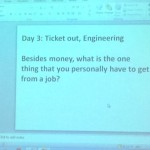In December, Donnie Dicus shared his blog, “The Broken Teacher Re-focused.” I had read other blogs by Jess Leddbetter and Treva Jenkins and countless articles about teacher stress and how the teaching profession has broken many teachers and we need to find ways to keep that from happening. All the time my focus was on the teachers at my school and what could I do differently to help support them or how could I re-adjust the schedule to give them more time, but today when I read Donnie’s blog, I read it from a different perspective. Maybe it was actually having a few connected days to spend with my family and not think about school. Maybe it was a new year’s resolution to find work-life balance or maybe it was reading this blog on Monday morning, a vacation day. Regardless, I read it as a principal and related it to the stress I carry each day, each night, and each week.
As I was reading I found myself getting anxious and becoming overwhelmed. I thought about emails from last week and this weekend which I had not replied to, emails with attachments and requests. I thought about teacher evaluations, data reflection meetings and portfolio meetings. My mind began to spin, days and weeks were flitting by and all things clear were becoming blurry, thinking about testing and mandatory professional developments, mid year data analysis and newsletters, school board meeting presentations and leadership day, parent meetings and cursive writing mandates, teacher interviews and new students, staffing paraprofessional positions and principal PLC notes, growth mindset and fixed mindset, school improvement goals and wildly important goals, student leadership roles and site council meetings, school calendars and IEP meetings, and on and on.
Then in the midst of my thoughts running this way and that, I stopped and and took a breath. I closed my eyes to hold back tears, tears of failure, tears of fear, tears of not being true to who I am. Then I realized I can do this and I will, I just need to get out of my head. I need to find that balance. And right now I am still on vacation, at least for another day or so. So I read on and came to a few strategies and changes that helped Donnie separate school and life. I have modified those and added a few to meet my needs:
1. I will only stay late when I have a pre-planned meeting or an emergency. Most days I stay until 4:00 or 5:00. When I leave school, work stays there and I go home, spending time with my husband, dogs and friends doing things I enjoy.
2. On holidays, my work stays at school. I am not so sure I can leave my bag there, not just yet. Holidays are meant to be spent with family, dogs and friends. Family and friends are my priority during holidays.
3. I will power down my phone and computer once I leave school. Any emails, other than emergencies will be answered the next day. My down time is important and cannot be consumed by work. I will take time each evening to answer reflective questions to evaluate my day and begin to plan the next day, taking time to visualize interactions and conversations, clearing my mind to sleep.
4. I will plan time for things I enjoy and I do not let work take that time away. Every “school day” morning I wake up at 4:00 and run with my dogs. They keep me present and focused, otherwise we get tangled up and that never ends well. On the weekends, I plan longer runs or hikes to stay active. This helps me get out of my head and start the day with a positive attitude and reduce stress.
5. I will practice meditation in the morning to quiet my mind allowing me to begin each day relaxed and focused. I will begin to notice what I am grateful for and anticipate things that are yet to come like new possibilities and new connections.
6. I will help prepare three Blue Apron meals each week with my husband. I will be fully present and enjoy our time together learning new ways to cook kale or beets and realize that we really do enjoy cod and catfish. Maybe one day we will actually prepare the garlic as instructed and not use the garlic from the jar.
7. I will focus on being a human being, not a human doing. I will ask questions and stop to listen for responses. I want to learn about the people in my life and who they are and I will have the courage to be fully present.
Although these changes are small, when I adhere to them I will reach work-life balance, more time to be a human being and not a human doing. I am hopeful that I can organize and commit to leave work at work and at the end of the day walk away more inspired and motivated. More focused on the bigger picture, a well-rounded, better version of me. I wonder how other principals and administrators stay focused on the present and keep from spinning out of control. What strategies or tricks do you have to maintain your work-life balance?










Comments 11
Thank you. You and Donnie have peeled back the skin to reveal wounds we all have but don’t often share. There is so much value in what we do, for others and for ourselves, but an underlying and inevitable hurt too. When you spend 10 to 12 hours a day hyper focused on the safety, emotions, and learning of hundreds of people, it’s damn near impossible to bottle enough energy for the single most important person in your life at the end of the day.
In literature, this existentialism is valued, questioned, and beautied. In life, it’s brushed off as complaint. I cringe every time I hear someone say “martyr complex” because it’s such an arrogant dismissal of the real side effects of social service. I think everyone in social work experiences these feelings, but I suspect teachers uniquely internalize them.
Thank you for sharing how you nearly broke down into tears. That transparency is so important for others who are struggling with the demands of our work. Even the best, most effective educators have moments when we are weak and want to fall apart. I know we all have our friends and families to depend on during times like this. However, they don’t really get it. They don’t understand how writing notes to 30 students can break an adult. Wouldn’t it be nice if we all a peer professional buddy that we could go to during times like this?! Someone that would listen to us and then help us dust off, wipe our faces, and stand us back up? Maybe fostering professional relationships like this could help to minimize stress for educators.
Thank you for being so vulnerable and honest! I have my admin degree now and could be an administrator, and your blog brings me both peace and fear about what could be my next step as an educator (taking the leap into admin). Thank you for showing the fears and vulnerability while still showing your strength and determination.
I am curious as to whether or how much the people around you will notice that you are working “less” (or at least fewer hours).
On the other hand, I wonder if the process of finding balance is like a weight-loss journey– the more you can be open and share your goals with those around you, the more support you will have in meeting these goals? I have a colleague at work who recently shared changes she was making to have more time an focus at home, and I know that I have personally been more forgiving when she doesn’t respond to an email right away, or when our chats about particular students feel cut short– but in reality are brief and to the point. I suppose it depends on the people around you. But either way, it provides a positive and realistic model for valuing work-life balance.
Knowing you and reading this brought tears to my eyes. You are an amazing administrator and we would all like to see you being for a long time. Your commitment to the profession is known and respected. Thank you for putting it out there and talking about what overwhelms you as well as what you can do to balance yourself and move forward. Stay balanced and share the weight.
Jen, this is an incredibly honest post, and one the type of honesty I think we’re often afraid to express when in the role of leadership. As a principal, I often felt any/much of my success would be contingent upon not just any skill I might have, but also on a certain amount (great deal?) of luck. The reality was that principals are so over-taxed, that they can’t possibly be ready for anything. I used to joke that what separated me from positive recognition and having Anderson Cooper reporting live from my parking lot was often a helping of luck (and other quality people I worked with). That said, I don’t know where we’d be without principals like you. Keep up the good work and do your best to stick to these resolutions!
Thank YOU for being an administrator so that I can be a teacher! You all carry a huge amount of stress, and I am grateful for excellent leaders in this treacherous educational landscape! Lead on!
Within our virtues we often find our failings. I think that two virtues of the best principals are their drive and desire to support their staff. That sometimes leads them to want to save the day. I hope that doesn’t sound mean, but both administrators at my school freely admit that’s their tendency. By putting these limits, I bet your teachers will find a self-reliance they didn’t know they had and that will be better for everyone. Ironically, my impulse is to share this with them, but they’d feel obligated to read it, and I don’t want to add to their plate.
Thank you Jen for being so open and honest in your post. I know this post will help other leaders and principals be more comfortable to share and not go it alone. Whether we are teachers or principals, we are all in this together. Like Angie, knowing you and knowing how amazing you are, my heart melted when I read this. I would love to share these strategies with other principals and teachers. Jen, thanks for all you do. I appreciate you. We appreciate you. We need more administrators like you!
https://uploads.disquscdn.com/images/bf6d45a16269b12abada78d31d02081aba13bb7a8f9ef9d204c8959600ad7619.png
Jen, your honesty is amazing. You’ve given me a peek into the stressful life of a busy school administrator. I resolve to cut my own admin more slack when emails don’t get a reply right away or my classroom hasn’t been visited in weeks (or months). Maybe we all need to resolve to cut each other more slack. Kids can feel and react to stressed teachers and administrators and I’m sure it has a negative impact on school culture.
What a fantastic post! This is the first time I have read about the stresses of working in education from an administrator’s perspective – thank you for being so candid and vulnerable with your readers on this very important subject.
Although I do not know you personally, I can tell that you are an incredibly insightful and committed person: I am sure that you are a phenomenal principal. In any profession, I think there is a huge taboo surrounding asking for help and admitting that you are struggling. As you already know, students can absolutely sense when something is askew with their teachers and administrators – making a conscientious effort towards bettering yourself and making your life less stressful benefits everyone at your school just as much as it benefits you.
I especially like your point about focusing on being a “human being, not a human doing” – I think all of us need to internalize this for our own lives.